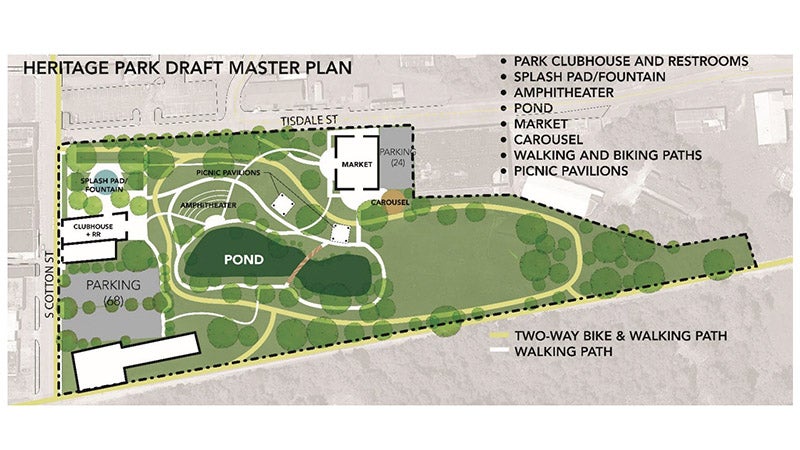Commission votes to shift to unit system
Published 11:59 pm Monday, January 26, 2009
With a 3-2 vote, commissioners agreed Monday to move to a unit road system after requested 2 percent budget cuts weren’t enough to correct the county’s current financial crisis.
Lynn Sasser, in his first vote as commission chairman, cast the deciding vote after District 2 commissioner Bragg Carter made the motion to move to a unit system and District 1 commissioner David Ellis seconded it. Commissioners Harold Elmore (District 3) and Carl Turman (District 4) opposed the move.
Nearly two weeks ago, department heads and elected officials were asked come up with a 2 percent reduction in their overall budgets for the current fiscal year. By the end of last week, those stakeholders had offered at least 2 percent reductions, with some areas offering to cut more. Commission-ers, in turn, responded by submitting a proposed list of equipment reductions.
Commis-sioners also voted to implement a hiring freeze and eliminate overtime through the end of the fiscal year unless it’s reimbursed by an outside entity. They also discussed the possibility of selling the U.S. Department of Agriculture building and the 61 acres near the Kiwanis Center previously designated as the site for a joint city-county sports complex.
“We’re still short,” said county administrator Brenda Petty. “We’re going to have to keep working to balance, so that our expenses don’t exceed our revenue.”
“Even with the 2 percent cuts, it is a Band-Aid on our problem,” Ellis said. “To be able to afford the equipment we need to run our districts, I don’t know. I do know we have to utilize the equipment we have left and we have to talk about consolidating. I know it’s a hard decision, and it’s just my opinion. It’s unfair to (Elmore or any other commissioner) to keep up more roads with less equipment.
“If we put it under the engineer and divide the county equally … I think we need to make it official,” he said.
Carter agreed, going as far as to make the motion that has been talked about for decades — the move to a unit road system.
Under the district system, the county operates with each commissioner controlling the roadwork and employees in his specific districts.
Under a unit system, the commission employs a county engineer who supervises and directs the daily operations of the county’s road department and is responsible for the direction of all maintenance, construction, engineering and administration activities related to the county’s road and bridge system.
At present, Covington County operates under a modified system in which commissioners are responsible for the dirt roads and employees in their districts while the county engineer oversees maintenance of the county’s paved roads and bridges.
“First, I know a lot of hard work went into (the cost saving measures for the county),” Carter said. “I think all of us, sitting back, hoped the state of things would get better all over. I think it’s time to do something about the situation — something that would work for all of us.
“I make a motion to go to the unit system,” he said. “It’s going to help us weather the storm. I knew that one day the economy would force us to do it and I think that day has come, as bad as I hate it.”
In Elmore County, just east of Montgomery, a move to a unit system saved the county more than $2 million and translated into more than $30 million in federal and state project funding, according to its commission chairman Joe Faulk.
Before seconding Carter’s motion, Ellis stated that during recent discussions with “several influential people” it was stated that no help would be forthcoming if the county “didn’t help itself first.”
“Me and the chairman have met with several people – one who was pretty influential – and we talked about how to help the county,” he said. “He assured us that before we got any help from him, we’d first have to help ourselves. Based on that help that we need, I second that motion.
“I don’t believe this system will come together unless we come together as a group to make the choice to move this county forward,” he said. “We can make it fail or we can make it work.”
Elmore and Turman both voted against moving to the unit system, stating they believed the level of services would decrease as a result of the move.
“I don’t want to sound like I don’t want the county to move forward,” Turman said. “My men are against it. I guess I vote with the heart of my men. I’ve got 200 miles of dirt road and two graders and get a cussing a week. I’m going to tell (citizens) to call the engineer, and they’ll say they didn’t vote for the engineer.”
Sasser said the decision to move to a unit system would hopefully eliminate the need for layoffs in the future.
“Financial situations sometimes make people do things they don’t want to do,” he said. “But I’m concerned about the county and I want to make the best decisions I can to keep the county afloat.”
County engineer Darren Capps, whose primary job now will be to coordinate road projects in the county, said he is looking forward to the challenge of a unit system.
“I need 100 percent commitment from all of us,” Capps said. “It’ll be tough the first two years, I’ve been told. We’re already on a modified unit system.”
Capps had already presented a plan for equipment consolidation to the commission before the unit system vote was taken. It is expected to save the county $250,000 annually in equipment payments alone.
He also said he doesn’t foresee any reduction in the workforce as a result of implementing the unit system.
“I looked at employee numbers and I don’t see a way to cut,” he said. “I just want to rule that out upfront. I probably could use two or three more.”
Each of the commissioners replied, “hiring freeze.”




